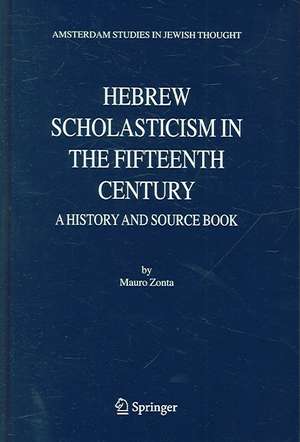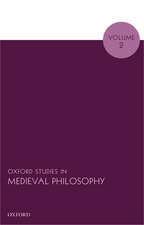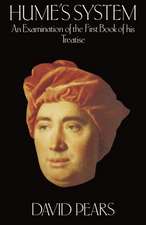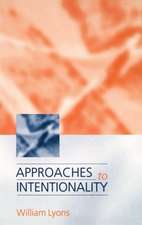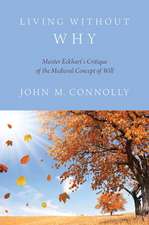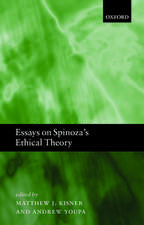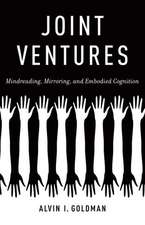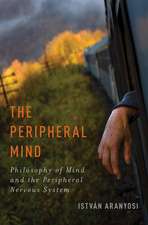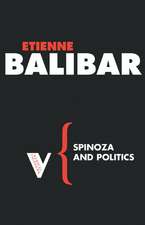Hebrew Scholasticism in the Fifteenth Century: A History and Source Book: Amsterdam Studies in Jewish Philosophy, cartea 9
Autor Mauro Zontaen Limba Engleză Hardback – 22 feb 2006
The aim of this book is to give an idea of the extent and character of this hitherto neglected "Hebrew Scholasticism". After a general historical introduction to this phenomenon, and bio-bibliographical surveys of these philosophers, the book gives complete or partial annotated English translations of the most significant Hebrew Scholastical works. It includes also critical editions of some parts of these texts, and a Latin-Hebrew glossary of Scholastical technical terms.
| Toate formatele și edițiile | Preț | Express |
|---|---|---|
| Paperback (1) | 949.23 lei 6-8 săpt. | |
| SPRINGER NETHERLANDS – 22 noi 2010 | 949.23 lei 6-8 săpt. | |
| Hardback (1) | 955.56 lei 6-8 săpt. | |
| SPRINGER NETHERLANDS – 22 feb 2006 | 955.56 lei 6-8 săpt. |
Preț: 955.56 lei
Preț vechi: 1165.32 lei
-18% Nou
Puncte Express: 1433
Preț estimativ în valută:
182.84€ • 191.42$ • 151.29£
182.84€ • 191.42$ • 151.29£
Carte tipărită la comandă
Livrare economică 05-19 aprilie
Preluare comenzi: 021 569.72.76
Specificații
ISBN-13: 9781402037153
ISBN-10: 1402037155
Pagini: 388
Ilustrații: VII, 388 p.
Dimensiuni: 155 x 235 x 22 mm
Greutate: 0.74 kg
Ediția:2006
Editura: SPRINGER NETHERLANDS
Colecția Springer
Seria Amsterdam Studies in Jewish Philosophy
Locul publicării:Dordrecht, Netherlands
ISBN-10: 1402037155
Pagini: 388
Ilustrații: VII, 388 p.
Dimensiuni: 155 x 235 x 22 mm
Greutate: 0.74 kg
Ediția:2006
Editura: SPRINGER NETHERLANDS
Colecția Springer
Seria Amsterdam Studies in Jewish Philosophy
Locul publicării:Dordrecht, Netherlands
Public țintă
ResearchCuprins
Foreword.- Abraham Bibago.- Baruch Ibn Ya'ish.- Abraham Shalom and Eli Habillo.- Judah Messer Leon.- Index of Authors of Antiquity, Middle Ages and Early Modern (up to 1600).- Index of Modern Authors.- Index of Manuscripts.- Hebrew Section.
Textul de pe ultima copertă
In their pursuit of a renewal of Jewish philosophy, a number of scholars active in Spain and Italy in the second half of the fifteenth century (Abraham Bibago, Baruch Ibn Ya‘ish, Abraham Shalom, Eli Habillo, Judah Messer Leon) turned to the doctrines and methods of contemporary Latin Scholasticism. These philosophers, who read Latin very well, were impressed by the theories formulated by their Latin colleagues (Albert the Great, Thomas Aquinas, William of Ockham, John Duns Scotus and their followers). They composed original works in Hebrew (mainly commentaries and questions on Aristotle), in which they faithfully reproduced the techniques and terminology of late Scholasticism, and explicitly quoted and discussed Scholastic texts and doctrines about logic, physics, metaphysics and ethics.
Thus, in fifteenth century Italy and Spain there came into being what we may call a "Hebrew Scholasticism": Jewish authors composed philosophical treatises in which they discussed the same questions and used the same methods as contemporary Christian Schoolmen. These thinkers were not simply influenced by Scholasticism: they were real Schoolmen who tried to participate (in a different language) in the philosophical debate of contemporary Europe.
A history of "Hebrew Scholasticism" in the fifteenth century is yet to be written. Most of the sources themselves remain unpublished, and their contents and relationship to Latin sources have not yet been studied in detail. What is needed is to present, edit, translate and comment on some of the most significant texts of "Hebrew Scholasticism", so that scholars can attain a more precise idea of its extent and character.
This book aims to respond to this need. After a historical introduction, where a "state of the art" about research on the relationship between Jewish philosophy and science and Latin Scholasticism in the thirtheenth-fifteenth centuries is given, the book consists of four chapters. Eachof them offers a general bio-bibliographical survey of one or two key-authors of fifteenth-century "Hebrew Scholasticism", followed by English translations of some of their most significant "Scholastic" works or of some parts of them: Abraham Bibago’s "Treatise on the Plurality of Forms", Baruch Ibn Ya’ish’s commentaries on Aristotle’s "Nicomachean Ethics" and "De anima", Eli Habillo’s introduction to Antonius Andreas’s commentary on the "Metaphysics", Judah Messer Leon’s commentary on Aristotle’s "Physics" and questions on Porphyry’s "Isagoge". The Hebrew section includes critical editions of some of the translated texts, and a Latin-Hebrew glossary of technical terms of Scholasticism.
Thus, in fifteenth century Italy and Spain there came into being what we may call a "Hebrew Scholasticism": Jewish authors composed philosophical treatises in which they discussed the same questions and used the same methods as contemporary Christian Schoolmen. These thinkers were not simply influenced by Scholasticism: they were real Schoolmen who tried to participate (in a different language) in the philosophical debate of contemporary Europe.
A history of "Hebrew Scholasticism" in the fifteenth century is yet to be written. Most of the sources themselves remain unpublished, and their contents and relationship to Latin sources have not yet been studied in detail. What is needed is to present, edit, translate and comment on some of the most significant texts of "Hebrew Scholasticism", so that scholars can attain a more precise idea of its extent and character.
This book aims to respond to this need. After a historical introduction, where a "state of the art" about research on the relationship between Jewish philosophy and science and Latin Scholasticism in the thirtheenth-fifteenth centuries is given, the book consists of four chapters. Eachof them offers a general bio-bibliographical survey of one or two key-authors of fifteenth-century "Hebrew Scholasticism", followed by English translations of some of their most significant "Scholastic" works or of some parts of them: Abraham Bibago’s "Treatise on the Plurality of Forms", Baruch Ibn Ya’ish’s commentaries on Aristotle’s "Nicomachean Ethics" and "De anima", Eli Habillo’s introduction to Antonius Andreas’s commentary on the "Metaphysics", Judah Messer Leon’s commentary on Aristotle’s "Physics" and questions on Porphyry’s "Isagoge". The Hebrew section includes critical editions of some of the translated texts, and a Latin-Hebrew glossary of technical terms of Scholasticism.
Caracteristici
The only existing book specially devoted to the relationship between Latin Scholasticism and Jewish Philosophy in the 15th century
